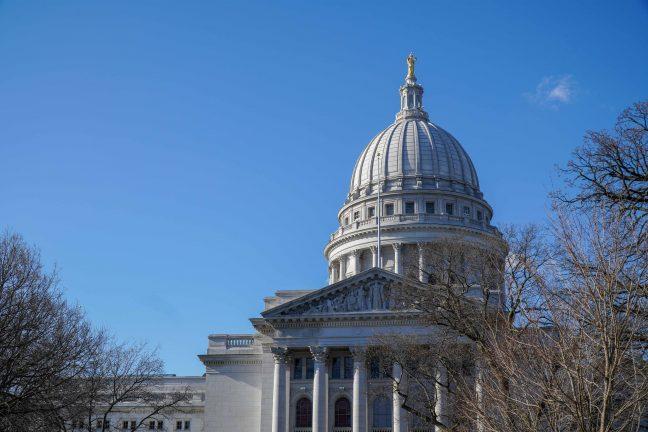It has been nearly seven months since Wisconsin recorded its first case of coronavirus back in February of this year, and since then, the COVID-19 pandemic has uprooted the lives of just about everyone, everywhere. Wisconsin has recorded over 75,000 total cases, currently averaging about 700 cases a day.
What has proven a dubious side effect of this pandemic, however, transcends the ever-growing case count. The economic downturn and rise in unemployment plaguing the U.S. continue to put a serious strain on Wisconsin residents, and President Trump’s new order to extend unemployment benefits at a lower rate than before will only further constrain the state’s already reduced budget for spending.
On March 27, Congress passed the CARES Act, which provided an additional $600 a week in unemployment assistance, supporting those who had recently been laid off with an essential financial cushion at the start of the pandemic. Shortly after, Gov. Tony Evers announced a $70 million, or 5% state budget cut, including a state hiring freeze to combat the economic strain COVID-19 had caused.
Wisconsin must allocate more funding to public defenders in effort to reform criminal justice system
The UW System, already operating under financial strain after sending students home and transitioning to remote instruction, felt roughly 59% of this initial cut. In July, Evers ordered another $250 million in cuts due to “declining revenues,” just about three months following the first round of cuts.
Given how intensely the pandemic has impacted the Wisconsin budget since its onset in March, it would be reasonable to anticipate that unemployment benefits, which according to The New York Times, have kept “millions afloat” amidst rising unemployment claims and financial insecurity, would continue at their current level, or at the very least, without the aid of struggling state budgets.
But Trump’s new order, announced in early August, does just the opposite.
According to a White House Memorandum, new unemployment benefits would require states to “provide temporary enhanced financial support to those whose jobs or wages have been adversely affected by COVID-19.” What this means is that on top of the $200 reduction of the $600 weekly unemployment benefits addition, which expired August 1, states will be expected to front $100 of the benefits, with the federal government supporting the remaining $300.
Wisconsin voter ID laws unfairly target out-of-state students, requirements must change
According to Republicans, keeping the benefits at $600 disincentivizes beneficiaries from returning to work, so, therefore, $400 is a fair compromise. While this may be true theoretically, COVID-19 has caused an unprecedented strain on certain industries, subsequently causing rising unemployment, not simply an unwillingness to hire more workers or search for work.
On the other hand, according to the Associated Press, several governors claimed $100 a week is an unaffordable ask, and as Wisconsin state lawmakers anticipate further cuts as the pandemic continues, supporting these unemployment benefits when the federal government has already been doing so would further constrain the state budget.
Not only is it unclear whether Trump has the ability to extend the unemployment benefits under an executive order, or without Congressional approval, but it is also uncertain whether the federal aid earmarked for such an extension can even last to support unemployed workers for the foreseeable future.
According to Andrew Stettner, an expert on unemployment aid affiliated with The Century Foundation, the $44 billion in aid set aside by the Trump Administration could run out in “five or six weeks.”
As of August 11, Evers has declined to state whether Wisconsin will accept Trump’s new order and agree to contribute $100 a week to support continued federal unemployment benefits. Evers instead asked the Trump administration and Congress in a statement to“work together and act quickly to pass legislation that will provide real assistance for families and additional support and resources for states that are on the frontlines of responding to this pandemic.”
Yet again, politics prioritized ahead of public’s safety in Wisconsin
If Wisconsin were to agree to the new order, Evers could use money allocated to Wisconsin under the CARES Act to provide $100 a week in benefits, but this would prevent the emergency aid from being used for other sectors in need of funds.
For example, UW’s budget relies on state funding, and with current cuts in place and financial uncertainty ahead, they should not have to use emergency funding to cushion unemployment benefits that federal aid has established up to this point.
Fortunately, statewide unemployment has decreased since the height of the pandemic, when the unemployment rate was 13.6%. Currently, unemployment is at 7%, which may seem like a significant drop, but compared to the pre-pandemic level of 3%, it’s clear unemployment has not returned to a normal, stable level.
With the upcoming general election, anticipated budget cuts and a financially strained public university system, bipartisan support for a new and effective order is essential to not only support Wisconsin residents as the pandemic rages on and prevents many from returning to work, but in keeping a battleground state like Wisconsin from political disillusionment if a broader relief package cannot be agreed upon soon.
While governors plead for more aid from the Trump administration, real livelihoods continue to be at stake.
Anne Isman ([email protected]) is a sophomore studying economics.





















